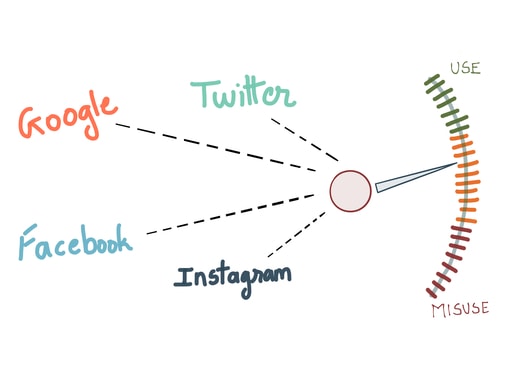Social Media has become one of the integral part of our lives. Whenever you find some time spare, you quickly check your social media space created by Internet giants like Facebook, Twitter, Instagram, etc. Why do you do it? According to some psychologists, top reason people turn to social media is to get social acceptance disguised under the name of entertainment. Off late, accessing it has become more easier with the penetration of smartphones and Internet. As per data, in 2011 Facebook had 109 million users in India, this number now has proliferated to 226 million in 2017, i.e. showing a growth of around 108%. Smartphones ensures this number to grow at 10-15% YOY.
With the numbers mentioned above, you can imagine the amount and frequency of data being generated and shared everyday, and how important this data can get. We have become so habitual to social networks that with impulse we posts whatever comes to our mind, we share our current locations, the places we visit, the people we are accompanied with, what movie we watch, what restaurants we visit, what cuisine we like and what not. Some clickbait companies have mastered the way to extract this information from Internet giants (with your consent) and build their empires.
What kind of data is collected?
Whenever you sign up on to a social platform you generally never hesitate to provide basic information like name, email id, date of birth; Unknowingly you are giving away some very important information, using which Internet giants are piling up tonnes of money. Below I list some information that you are providing to social platforms:
Obviously the things you share
Since you are using a platform, the tings you do are obviously store in their database and they have all right to access, process and analyze it to their advantage. Some examples could be your posts, photos, tagged location.
Behind the scenes
Platforms also tend to collect data that they can use to understand how you are using their services; so that they could do so called A/B Testing. Some examples here are the kind of data you view, hover upon, react and that engages you and the amount of time you spend on any/every section of the page.
Your friend circle
Most of the social platforms are “friend” oriented. Hence you tend to tag your friends in some of your post/image/event. This information seems meaningless from the top but deep inside this is used to create a huge gigantic graph/network that shows and represents the interaction depth of two people, relationship, strength of the bond and their degree of seperation.
Financial Data
Some platforms also provide some kind of services which they charge for and ask you pay via Credit or Debit card, address and contact details. They save this information in their system so that you do not have to type information again and with this they say that they provide you better User Experience.
Device information
As user can use any device to access any social media, the giants keep track of information like which device you last access their site from or browser you used and even location. This is done so that they could analyze, optimize and target a particular segment and find improvement hot spots in their systems.
How do they use this data?
Now comes the real question, how are they actually utilizing all of the above information. In this rat race of social media everyone is trying to be the best. There are several uses of the data they collect from you
Personalization and Relevance
In recent past the most booming field and most hyped terminologies were Machine Learning and Personalization; everybody was (is and are) doing it. Every company (small or huge) wants to personalize user experience and show them relevant content. Right from Google News, to Facebook feeds to Quora answers, everything is tailor made - just for you. In order to implement personalization algorithms and make system smarter they need data; and hence they are collecting as much data as they can from the user.
Revenue through Advertisements
Most of the Internet companies have “Advertisements” as their revenue stream. More relevant the ads are to the user, higher is the probability of user clicking on the ad and higher is the revenue. Hence system needs to be really smart about what sort of ads to be shows to a user. For this generally your past browsing history, activities, interactions are taken into consideration.
Share your data with other applications and services
Internet giants do not directly sell or share your data to other applications and services. But they do so by taking your consent before sharing it. This is done via OAuth (Login via Google/Facebook). Social media companies share your public profile data to such third party websites/apps when you login to it using say Facebook/twitter or try to share some website data on Facebook. All such websites are of course obliged to get the permission of user to collect his/her photos, friends list, birthday, timeline posts, but it is always doubtful of how much is any user aware of such things before giving the permission to access his information. Social media companies have no control on how these third parties make use of such shared public data.
Data Analytics
Banks, credit card companies, retail shops, marketing companies, e-commerce firms use data analytics to their benefit. For e.g. Some credit card companies use your profile, posts, your friends profiles to decide whether to offer you a credit card or not. So in turn, it helps prevent frauds. Some other users of data analytics is target segmentation, anomaly detection, fraud detection and relevance and understanding consumer preferences and behavior.
Can the data be misused?
Yes! Of course!
A very well written article, written by Arpit, explains how facebook apps like “Which Indian Celebrity Do You Look Like” can misuse your data. I would explain it in a gist here:
Applications uses OAuth authentication (Login via Facebook) and takes your consent to extract and access some of your data through existing social media. Some of the data requested has nothing to do with the app but still it asks you for it. And Internet giant, since they have your consent, share it with them. Such application/websites may:
- Sell this data to some fraudulent entity which engages in sending spams or scams.
- Create fake profiles on different platforms and use it for illegal activities.
- Misuse your photos and data to blackmail someone.
Conclusion
In today’s world, using social media may be unavoidable, but one can be careful on what data they share publicly. With the impulse, one should not post any incriminating or illegal content, without understanding its ramifications. One should be careful before making any of personal data public. Social media data has been making life easier for users and businesses but this too has a flip side which can be avoided with more shrewd use. write here.

